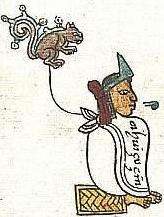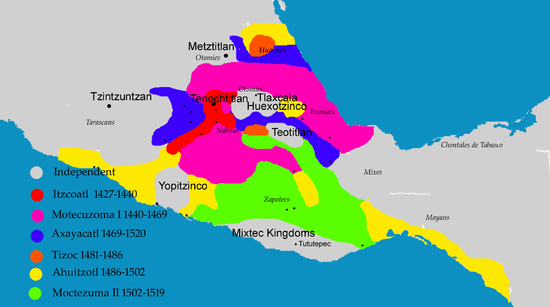Ahuitzotl
| Ahuizotl | |
|---|---|
|
8th Tlatoani of Tenochtitlan Ruler of the Aztec Triple Alliance | |
 Ahuitzotl in the Codex Mendoza | |
| Reign | 7 Rabbit (1486) – 10 Rabbit (1502) |
| Predecessor | Tizoc |
| Successor | Moctezuma II |
| Died | 10 Rabbit (1502) |
| Consort | Tlilancapatl |
| Issue |
King Chimalpilli II King Cuauhtémoc Daughter |
| Father | Tezozomoc |
| Mother | Atotoztli II |
Ahuitzotl (Nahuatl: āhuitzotl, pronounced [aːˈwit͡sot͡ɬ]) was the eighth Aztec ruler, the Hueyi Tlatoani of the city of Tenochtitlan, son of princess Atotoztli II. He was responsible for much of the expansion of the Mexica domain, and consolidated the empire's power after emulating his predecessor. He took power as tlatoani in the year 7 Rabbit (1486), after the death of his predecessor and brother, Tizoc.
His sons were kings Chimalpilli II and Cuauhtémoc and he also had one daughter.
Biography
Perhaps the greatest known military leader of Pre-Columbian Mesoamerica, Ahuizotl began his reign by suppressing a Huastec rebellion, and then swiftly more than doubled the size of lands under Aztec dominance. He conquered the Mixtec, Zapotec, and other peoples from Pacific Coast of Mexico down to the western part of Guatemala. Ahuizotl also supervised a major rebuilding of Tenochtitlan on a grander scale including the expansion of the Great Pyramid or Templo Mayor in the year 8 Reed (1487).
He presided over the introduction of the great-tailed grackle into the Valley of Mexico, the earliest documented case of human-mediated bird introduction in the Western Hemisphere.[1]
Ahuizotl died in the year 10 Rabbit (1502) and was succeeded by his nephew, Moctezuma II.
Ahuizotl took his name from the animal ahuizotl, which the Aztecs considered to be a legendary creature in its own right rather than a mere mythical representation of the king.
Map

Tomb
On 3 August 2007, Mexican archaeologists announced discovery of what is believed to be the tomb of Ahuizotl beneath a sculpture of Tlaltecuhtli near the Zócalo in Mexico City.[3][4]
Notes
- ↑ Haemig, Paul D. (January 2012). "Introduction of the Great-tailed Grackle (Quiscalus mexicanus) by Aztec Emperor Auitzotl: Provenance of the historical account (La Introducción de la Quiscalus mexicanus por el Emperador Azteca Auitzotl: Origen del Relato Histórico)". The Auk. University of California Press. 129 (1): 70–75. doi:10.1525/auk.2011.11058. JSTOR 10.1525/auk.2011.11058.
- ↑ Based on the maps by Ross Hassig in "Aztec Warfare".
- ↑ http://www.newsday.com/news/nationworld/world/wire/sns-ap-mexico-aztec-tomb-summary-box,0,1155875.story
- ↑ AP Exclusive: Archaeologists locate what they believe are funeral chambers of Aztec emperor - International Herald Tribune
References
- Townsend, Richard F. (2000) The Aztecs. revised ed. Thames and Hudson, New York.
- Hassig, Ross (1988) Aztec Warfare: Imperial Expansion and Political Control. University of Oklahoma Press, Norman.
- Weaver, Muriel Porter (1993). The Aztecs, Maya, and Their Predecessors: Archaeology of Mesoamerica (3rd ed.). San Diego: Academic Press. ISBN 978-0-01-263999-3.
External links
| Wikimedia Commons has media related to Ahuitzotl. |
| Preceded by Tizoc |
Tlatoani of Tenochtitlan 7 Rabbit (1486) – 10 Rabbit (1502) |
Succeeded by Moctezuma II |